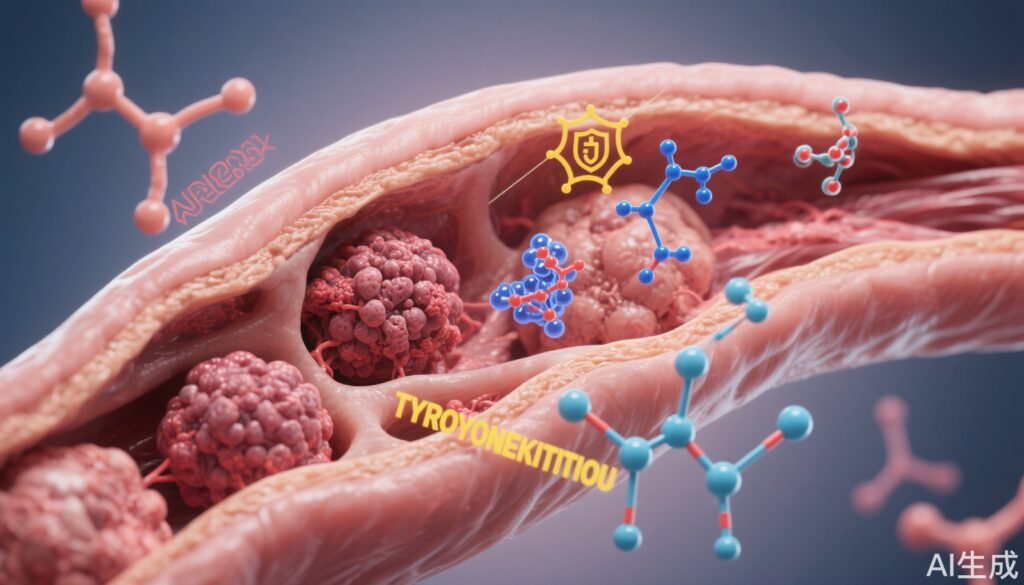Highlights
- Cabozantinib plus atezolizumab significantly improved progression-free survival (PFS) versus androgen receptor pathway inhibitor (ARPI) switch in patients with metastatic castration-resistant prostate cancer (mCRPC) and extrapelvic soft-tissue metastases.
- No statistically significant improvement in overall survival (OS) was observed with the combination therapy compared to ARPI switch.
- The combination regimen was associated with a higher incidence of grade 3–4 adverse events, but no new safety signals emerged.
- This study identifies a novel, non-AR-targeted therapeutic option for a difficult-to-treat mCRPC population.
Clinical Background and Disease Burden
Metastatic castration-resistant prostate cancer (mCRPC) represents a late and lethal disease stage, particularly in patients with extrapelvic soft-tissue metastases who have progressed on androgen receptor pathway inhibitors (ARPI) such as abiraterone or enzalutamide. This subgroup faces a dismal prognosis and limited treatment options, as cross-resistance among sequential ARPIs is common and few non-AR-targeted therapies have demonstrated robust efficacy. There is a pressing unmet need for effective therapies that act independently of AR signaling.
Research Methodology
CONTACT-02 was a global, multicenter, open-label, phase 3 randomized trial (ClinicalTrials.gov: NCT04446117) conducted at 184 sites across 24 countries from 2020 to 2023. Eligible patients were adult men (≥18 years) with mCRPC, Eastern Cooperative Oncology Group (ECOG) performance status 0 or 1, and measurable extrapelvic soft-tissue metastases (lymph node or visceral) progressing on a single prior ARPI.
Patients (n=575) were randomized 1:1 to:
- Cabozantinib (40 mg orally once daily) plus atezolizumab (1200 mg IV every 3 weeks)
- ARPI switch: abiraterone (1000 mg orally once daily plus prednisone 5 mg twice daily) or enzalutamide (160 mg orally once daily)
Randomization was stratified by liver metastasis, prior docetaxel use, and disease status at first ARPI initiation. Co-primary endpoints were PFS (first 400 patients, ITT) and OS (all randomized patients, ITT). Safety was assessed in all treated patients.
Key Findings
Efficacy:
- Median PFS was significantly longer with cabozantinib plus atezolizumab than with ARPI switch: 6.3 months (95% CI, 6.2–8.8) vs 4.2 months (95% CI, 3.7–5.7), hazard ratio (HR) 0.65 (95% CI, 0.50–0.84), p=0.0007.
- Median OS was similar between the groups: 14.8 months (95% CI, 13.4–16.7) for the combination vs 15.0 months (95% CI, 13.0–18.5) for ARPI switch; HR 0.89 (95% CI, 0.72–1.10), p=0.30.
Safety:
- Grade 3–4 adverse events occurred in 56% (cabozantinib plus atezolizumab) vs 26% (ARPI switch).
- Common grade 3–4 events with cabozantinib plus atezolizumab: hypertension (8%), anemia (8%).
- Serious treatment-related adverse events: 16% (combination group) vs 4% (ARPI switch).
- Study treatment discontinuation due to adverse events: 17% (combination) vs 15% (ARPI switch).
- No treatment-related deaths reported.
Mechanistic Insights and Biological Plausibility
Cabozantinib is a multikinase inhibitor affecting MET, VEGFR, and AXL, which not only impairs tumor angiogenesis and growth but also modulates the tumor microenvironment, potentially enhancing antitumor immunity. Atezolizumab, a PD-L1 inhibitor, releases T-cell inhibition. Preclinical and early clinical studies suggested synergy between these agents, especially in tumors with immune-excluded phenotypes or limited immunogenicity, as is the case in prostate cancer. However, the modest impact on overall survival in this trial suggests that immune modulation alone may be insufficient in unselected mCRPC populations, and the benefit may be driven by disease control rather than durable remission.
Expert Commentary
Notably, the trial demonstrates that a non-AR-targeted approach can delay disease progression in a heavily pretreated, poor-prognosis group. However, the lack of OS benefit tempers enthusiasm for widespread adoption without further biomarker-driven selection. As Dr. Sumanta Pal and colleagues note in accompanying editorials, “The data support a role for combination strategies beyond AR inhibition, but highlight the need for predictive biomarkers and careful management of toxicity.”
Controversies or Limitations
- The open-label design may introduce assessment bias, particularly in PFS endpoints.
- Generalizability to patients without measurable soft-tissue metastases or those with poor performance status is limited.
- Substantial toxicity was observed, necessitating vigilant patient selection and management.
- The absence of OS benefit raises questions about the clinical value of PFS improvement alone.
- Biomarker analyses (e.g., PD-L1 expression, genomic alterations) were not reported in this analysis but may identify subgroups deriving greater benefit.
Conclusion
The CONTACT-02 trial provides evidence that cabozantinib plus atezolizumab improves PFS in mCRPC patients with extrapelvic soft-tissue metastases after ARPI failure, with a manageable but appreciable toxicity burden. However, the absence of overall survival benefit and increased adverse events underscore the need for careful patient selection and further research into predictive biomarkers. This regimen offers a mechanistically distinct option for a population with limited alternatives but requires individualized risk–benefit assessment.
References
- Agarwal N, Azad AA, Carles J, Matsubara N, Oudard S, Saad F, Merseburger AS, Soares A, McGregor BA, Zurawski B, Tsiatas M, North S, Bondarenko I, Alfie M, Bournakis E, Antonuzzo L, Evilevitch L, Simmons A, Wang F, Ferraldeschi R, Nandoskar P, Pal SK. Cabozantinib plus atezolizumab in metastatic prostate cancer (CONTACT-02): final analyses from a phase 3, open-label, randomised trial. Lancet Oncol. 2025 Jul;26(7):860-876. doi: 10.1016/S1470-2045(25)00209-8
- de Bono JS, et al. Abiraterone and increased survival in metastatic prostate cancer. N Engl J Med. 2011 May 26;364(21):1995-2005.
- Sternberg CN, et al. Enzalutamide in metastatic prostate cancer before chemotherapy. N Engl J Med. 2014 Jul 31;371(5):424-33.



